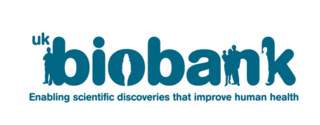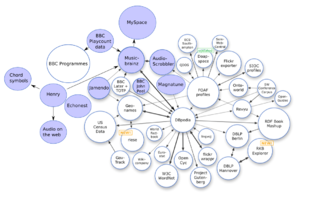Information privacy is the relationship between the collection and dissemination of data, technology, the public expectation of privacy, contextual information norms, and the legal and political issues surrounding them. It is also known as data privacy or data protection.

Association rule learning is a rule-based machine learning method for discovering interesting relations between variables in large databases. It is intended to identify strong rules discovered in databases using some measures of interestingness. In any given transaction with a variety of items, association rules are meant to discover the rules that determine how or why certain items are connected.

UK Biobank is a large long-term biobank study in the United Kingdom (UK) which is investigating the respective contributions of genetic predisposition and environmental exposure to the development of disease. It began in 2006.
Data cleansing or data cleaning is the process of detecting and correcting corrupt or inaccurate records from a record set, table, or database and refers to identifying incomplete, incorrect, inaccurate or irrelevant parts of the data and then replacing, modifying, or deleting the dirty or coarse data. Data cleansing may be performed interactively with data wrangling tools, or as batch processing through scripting or a data quality firewall.
The Minimum Data Set (MDS) is part of the U.S. federally mandated process for clinical assessment of all residents in Medicare or Medicaid certified nursing homes and non-critical access hospitals with Medicare swing bed agreements.

Open data is data that is openly accessible, exploitable, editable and shared by anyone for any purpose. Open data is licensed under an open license.
The National Minimum Data Set for Social Care (NMDS-SC) gathers information about the social care workforce to help employers with workforce planning in England. It also provides sector wide workforce intelligence to support strategic planning in the wider social care sector. In challenging economic times, shifting government policy and changing expectations of those needing care and support are altering the way the social care sector operates. The aim of the NMDS-SC is to provide workforce intelligence relied upon by government, strategic bodies, employers and individuals to make decisions that will improve outcomes for people who use services.
Research data archiving is the long-term storage of scholarly research data, including the natural sciences, social sciences, and life sciences. The various academic journals have differing policies regarding how much of their data and methods researchers are required to store in a public archive, and what is actually archived varies widely between different disciplines. Similarly, the major grant-giving institutions have varying attitudes towards public archival of data. In general, the tradition of science has been for publications to contain sufficient information to allow fellow researchers to replicate and therefore test the research. In recent years this approach has become increasingly strained as research in some areas depends on large datasets which cannot easily be replicated independently.
High production volume chemicals are produced or imported into the United States in quantities of 1 million pounds or 500 tons per year. In OECD countries, HPV chemicals are defined as being produced at levels greater than 1,000 metric tons per producer/importer per year in at least one member country/region. A list of HPV chemicals serves as an overall priority list, from which chemicals are selected to gather data for a screening information dataset (SIDS), for testing and for initial hazard assessment.
Skills for Care is the strategic workforce development and planning body for adult social care in England.
The Nursing Minimum Data Set (NMDS) is a classification system which allows for the standardized collection of essential nursing data. The collected data are meant to provide an accurate description of the nursing process used when providing nursing care. The NMDS allow for the analysis and comparison of nursing data across populations, settings, geographic areas, and time.
Disease or patient registries are collections of secondary data related to patients with a specific diagnosis, condition, or procedure, and they play an important role in post marketing surveillance of pharmaceuticals. Registries are different from indexes in that they contain more extensive data.
A human resource for health information system (HRHIS), also known as human resource information system (HRIS) — is a system for collecting, processing, managing and disseminating data and information on human resource for health (HRH). Depending on the level of development of a country's health care system and the organization of its workforce, an HRHIS can be computerized or paper-based, including information on numbers and distribution of health workers and track their career information. It is usually an integral part of a comprehensive health management information system, and may be used to monitor and assess the performance of the overall health system.
The Consensus Coding Sequence (CCDS) Project is a collaborative effort to maintain a dataset of protein-coding regions that are identically annotated on the human and mouse reference genome assemblies. The CCDS project tracks identical protein annotations on the reference mouse and human genomes with a stable identifier, and ensures that they are consistently represented by the National Center for Biotechnology Information (NCBI), Ensembl, and UCSC Genome Browser. The integrity of the CCDS dataset is maintained through stringent quality assurance testing and on-going manual curation.
Food composition data (FCD) are detailed sets of information on the nutritionally important components of foods and provide values for energy and nutrients including protein, carbohydrates, fat, vitamins and minerals and for other important food components such as fibre. The data are presented in food composition databases (FCDBs).
Common Operational Datasets or CODs, are authoritative reference datasets needed to support operations and decision-making for all actors in a humanitarian response. CODs are 'best available' datasets that ensure consistency and simplify the discovery and exchange of key data. The data is typically geo-spatially linked using a coordinate system and has unique geographic identification codes (P-codes).
Minimum information standards are sets of guidelines and formats for reporting data derived by specific high-throughput methods. Their purpose is to ensure the data generated by these methods can be easily verified, analysed and interpreted by the wider scientific community. Ultimately, they facilitate the transfer of data from journal articles into databases in a form that enables data to be mined across multiple data sets. Minimal information standards are available for a vast variety of experiment types including microarray (MIAME), RNAseq (MINSEQE), metabolomics (MSI) and proteomics (MIAPE).
COVID-19 datasets are public databases for sharing case data and medical information related to the COVID-19 pandemic.
The International Clinical Trials Registry Platform (ICTRP) is a platform for the registration of clinical trials operated by the World Health Organization.


